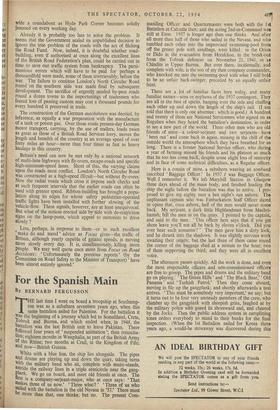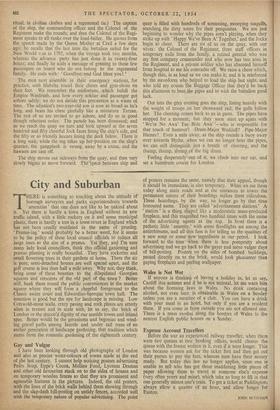For the Spanish Main
By BERNARD FERGUSSON HE last time I went on board a troopship at Southamp- ton was as a subaltern seventeen years ago, when this same battalion sailed for Palestine. For the battalion it Was the beginning of a journey which led to Somaliland. Crete, Tobruk and Burma, and which ended when, in 1948, the battalion was the last British unit to leave Pakistan. There followed four years of 'suspended animation'; then resuscita- tion; eighteen months in Westphalia, as part of the British Army Of the Rhine; two months at Crail, in the Kingdom of Fife; and now—British Guiana.
White with a blue line, the ship lies alongside. The pipes and drums are playing up and down the quay, taking turns With the military band who sit, complete with music-stands, astride the railway lines in a triple semicircle near the gang- plank. We go on board, and meet old friends at once. Tho first is a company-serjeant-major, who at once says: ' That Makes three of us now.' Three what? " Three of us who sailed with the battalion in the old Nevasa in '37.' There must be more than that, one thinks; but no. The present Com- manding Officer and Quartermaster were both with the 1st Battalion in Calcutta then; and the acting 2nd-in-Command was still at Eton. 1937 is longer ago than one thinks. And after all more than half of those who sailed in the Nevasa, and who tumbled each other into the improvised swimming-pool from off the greasy pole with sandbags, were killed : in the Orion or Dido in the evacuation from Heraklion, in the break-out from the Tobruk defences on November 21, 1941, or as Chindits in Upper Burma. But over there, incidentally, and complete with wife, is the son of my then company commander, who knocked me into the swimming-pool with what I still hold to be an unfair back-swinger, preceded by an equally unfair feint.
There are a lot of familiar faces here todax, and many familiar names—sons or nephews of the 1937 contingent. They are all in the best of spirits, hanging over the side and chaffing each other up and down the length of the ship's rail. (I am told that there is only one absentee : which is good.) A hundred and twenty of them are National Servicemen who signed on as Regulars when they heard the battalion's destination, in order to see a new part of the world. Three other men who are old friends of mine—a colour-serjeant and two serjeants—havo been out' and come back in again, missing in the chill of the outside world the atmosphere which they have breathed for so long. There is a former National Service officer, who during a year of farming missed his friends and his platoon so much that he too has come back, despite sonic slight loss of seniority and in face of some technical difficulties, as a Regular officer.
Here is a cousin of mine, a subaltern wearing an armband inscribed ' Baggage Officer.' In 1937 1 was Baggage Officer. Well I remember it. We left Maryhill Station in Glasgow three days ahead of the main body, and finished loading the ship the night before the battalion was due to arrive. I pro- posed to give my eighty men a last night's run ashore. The unpleasant captain who was Embarkation Staff Officer dared to opine that, once ashore, half of the men would never come back. My serjeant, a dark little Highlandman from Machri- hanish, fell the men in on the quay. I pointed to the captain, and said to the men : This officer here says that if you get shore leave you'll not all be back by eleven o'clock. Did you ever hear such nonsense? ' The men gave him a dirty look, and he shrank into the shadows. It was slightly nervous work awaiting their return; but the last three of them came round the corner of the baggage shed at a minute to the hour, two of them supporting the third; and they were all in excellent voice.
The afternoon passes quickly. All the work is done, and even the most responsible officers and non-commissioned officers are free to gossip. The pipes and drums and the military band go on playing ' The Green Hills ' and The Black Bear,' Old Panama' and Turkish Patrol.' Then they come aboard. moving in file up the gangplank; and shortly afterwards a taxi arrives. This must be somebody very important,' we say; but it turns out to be four very unsteady members of the crew, who clamber up the gangplank with sheepish grins, laughed at by the military police who guard its shoreward end, and cheered by the Jocks. Then the public address system in earsplitting tones orders everybody to stand to their bunks for the final inspection. (When the 1st Battalion sailed for Korea three years ago, a would-be stowaway was discovered during this ritual, in civilian clothes and a regimental tie.) The captain of the ship, the commanding officer and the Colonel of the Regiment make the rounds; and then the Colonel of the Regi- ment speaks to all ranks over the loud-hailer. He quotes from the speech made by the Queen Mother at Crail a few days ago; he recalls that the last time the battalion sailed for the New World was in 1795, when the voyage took two months, whereas the advance party has just done it in twenty-four hours; and finally he adds a message of greeting to those few passengers on board who do not belong to the regimental family. He ends with : Goodbye, and God bless you!
The men next assemble in their emergency stations, for practice, with lifebelts round their chests and gym-shoes on their feet. We remember the misfortune which befell the Empire Windrush, and how every soldier and passenger got ashore safely; we do not deride this precaution as a waste of time. The adjutant's two-year-old son is now as broad as he's long, and beats his chest gleefully like a miniature Tarzan. The rest of us are invited to go ashore, and do so in good though reluctant order. The parade has been dismissed; and as we reach the quay we turn and look upward at the seven hundred and fifty cheerful Jock faces lining the ship's side, and the fifty or so friendly lascars lining the 1eck below. There is a long wait, while the tug takes up her-position on the ship's quarter, the gangplank is swung away by a crane, and the hawsers are cast off.
The ship moves out sideways from the quay, and then very slowly begins to move forward. The'pace between ship and quay is filled with hundreds of screaming, swooping seagulls, searching the dirty water for their perquisites. We are just beginning to wonder why the pipes aren't playing, when they strike up with Happy We've Been A' Together,' and the Jocks begin to cheer. There are six of us on the quay, with our wives : the Colonel of the Regiment, three staff officers in temporary exile from the family, a retired general who was my first company commander and who now has two sons in the Regiment, and a private soldier who has absented himself from hospital to see his comrades off. We raise a cheer which, though thin, is as loud as we can make it; and it is reinforced by the stevedores who helped to load the ship last night, and who told my cousin the Baggage Officer that they'd be back this afternoon to hear. the pipes and to wish the battalion good luck.
Out into the grey evening goes the ship, listing heavily with the weight of troops on her shoreward rail; the gulls follow her. The cheering comes back to us in gusts. The pipes have stopped for a moment; but they soon start up again with ' We're No Awa' Tae Bide Awa"—who is responsible for that touch of humour? Drum-Major Weddell? Pipe-Major Haines? Even a mile away, as the ship rounds a buoy away over towards Hythe, when we can no longer hear the pipes, we can still distinguish just a breath of cheering, and the thump, thump, thump,of the big drum.
Feeling desperately' out of it, we climb into our car, and set a humdrum course for London.



































 Previous page
Previous page